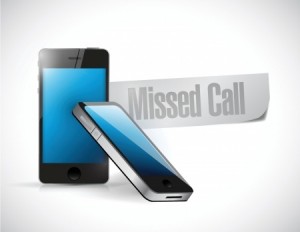 We’ve been seeing the warnings recently about a scam doing the rounds called the “one ring” or “missed call” scam.
We’ve been seeing the warnings recently about a scam doing the rounds called the “one ring” or “missed call” scam.
The warnings have come from Facebook, from the BBB and even from CBS – See this article from CBS Pittburgh.
And to this end, we would caution you that the “one ring” scam is real – but it’s perhaps not as potentially harmful as you might be lead to believe – for instance, our company President just got a phone call – one ring – the number showed up as “Antigua/Barbados” – and the number was ‘268-762-0023’. This particular number if you google it will find a lot of results where people are calling the number a scammer – example: 800Notes.com.
We would recommend that if you receive a phone call from a number you don’t recognize – do NOT immediately return the call! – instead, GOOGLE IT – look for the number, and check the caller complaint type websites – you may be surprised at what you learn – for example, this number (the Antigua/or Barbadan number) – it does appear to be a number where there are legitimate complaints. This is reason enough NOT to call the number back.
But what about the claims that you will be charged $19.95 + unknown fees to call it back?
Well… snopes.com has this say… One Ring Scam on Snopes.com.
Other versions of the warning caution that cell phone owners who return one-ring calls are charged $19.95 for an “international call fee” and then a “$9.00 per minute charge” on top of that. But Sprint currently lists its standard rate for placing calls from U.S. cell phones to the countries mentioned in the above example (Belarus and Latvia) at between $2.65 and $2.69 per minute (and as low as $0.41 to $0.43 per minute if the caller subscribes to an international long-distance plan), so a victim who returned such a call and stayed on the line for a couple of minutes before hanging up might realistically be out $5 or so in toll charges. Phone customers can generally get any “premium service” (i.e., “international call fee”) charges tacked on to such a call reversed by contacting their phone service providers and documenting the circumstances of the call.
Many forms of this warning list specific country/area codes that phone users should never place calls to (because of their association with various phone scams), including 473 (Grenada), 268 (Antigua), 876 (Jamaica), 809 (the Dominican Republic), 375 (Belarus), 371 (Latvia), and 284 (the British Virgin Islands). There is, of course, nothing wrong with connecting to numbers with these country/area codes if you happen to know whom you’re calling: all cautions regarding the one-ring scam (and similar schemes) apply only to solicitations to contact entities unknown to you. If you have to call a number associated with a dialing code that’s unfamiliar to you, you can use a code lookup site to check it out first.
Don’t rely on being scammed and getting your phone company to refund you – be aware – google the number before you call it and realize that you MIGHT be on the hook for any charges for calls you make … your phone company has no obligation to refund you fees for calls you really made!
